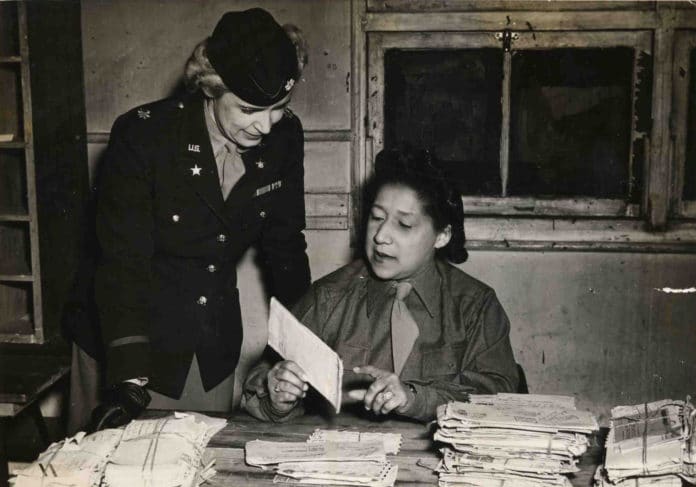Alyce Dixon, the nation’s oldest female veteran, who expedited mail delivery in wartime and later worked as a civilian at the Pentagon, facilitating what she called the purchase of everything from “pencils to airplanes,” died Jan. 27 at a veterans’ retirement center in Washington. She was 108.
The Department of Veterans Affairs announced the death but did not disclose the cause.
Dixon was working for the War Department’s secretarial pool at the newly constructed Pentagon when in 1943 she enlisted in the Women’s Auxiliary Army Corps, soon to be called the Women’s Army Corps.
She was initially limited to administrative assignments in Iowa and Texas before joining the newly established 6888th Central Postal Directory Battalion in early 1945. The battalion was the only unit of black women in the WACs to serve overseas in World War II and was led by Charity Adams, one of the first black female commissioned officers in the war.
The Army was still segregated at the time, and Dixon’s battalion – comprised of more than 800 African-American woman and based at posts in England and France – dined and was housed separately from other WACs.
The 6888th was tasked with sorting and distributing what she estimated were billions of backlogged letters and packages to soldiers – a pileup attributed to the disruption in delivery caused by the Battle of the Bulge.
Their mission was deemed vital to sustaining GI morale on the front lines, but a significant hurdle was identifying their ultimate destination based on incomplete information supplied by families.
“A lot of mothers wrote to ‘Buster, U.S. Army,’ or ‘Junior, U.S. Army,’ ” Dixon told an Army publication. “We knew every service member had a number and we had difficulty finding them, however, we found every person. Also a lot of wives and sweethearts wrote to soldiers every day. There were stacks and stacks of mail we had to send back indicating deceased. That was sad.”
She added: “We had to fight mice and rats while sorting the mail. People down south from Alabama were sending fried chicken and bread to soldiers in France.”
Working three shifts a day, seven days a week, the battalion accomplished in three months what was projected by the brass to take half a year.
She returned to Washington in the late 1940s and worked for the Census Bureau and later the Pentagon, retiring in 1972 as a purchasing agent.
“I was able to buy everything from pencils to airplanes,” she told the American Forces Press Service in 2009. “I became a good buyer. I dealt with all the stores here in Washington that sold office supplies.”
Salesmen, she added, were drawn to her wit. “They seemed to like to come and talk to me,” she added. “I cut up with them and they liked that.”
Alice Lillian Ellis was born in Boston on Sept. 11, 1907, and was the third of nine children. By the time the family settled in Washington, she had already altered the spelling of her first name, a tribute to silent movie actress Alyce Mills.
She graduated in 1925 from Washington’s Dunbar High School and briefly attended Howard University before quitting to find work and help her struggling father pay bills. She became a secretary at the Lincoln Theatre, which catered to black audiences, for $15 a week.
At 23, she married George Dixon and moved to New York. She said they divorced several years later, mostly the result of arguments over finances that reached a fever pitch over an $18 weekly grocery allowance. She was sending some of the money to her family, and her husband objected.
Dixon, who leaves no immediate survivors, said she never wanted children. Having helped raise her siblings gave her a lifelong aversion to motherhood. During the war and afterward, she prioritized travel to European capitals over husband-hunting.
She told the American Forces Press Service that she once wrote a piece called “The Long and Short of It,” published in a military publication, that contrasted her diminutive physique with that of her towering bunkmate. When the story reached bases around the world, she began receiving untold numbers of mash notes.
“All the short men wrote me a letter,” she said, adding that many even showed up in person. “I hated short men.”






